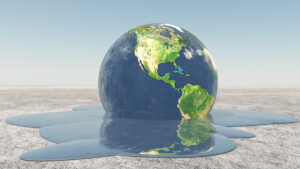Andrew McAffee (MIT) rose to international fame after writing the bestselling book “The second machine age” but in his most recent book, “More from less”, McAfee seeks to rebut the idea that economic growth is incompatible with a thriving planet.
What first surprised me was that the majority of the book does not actually go very much into detail in regards to the intricate relationship between GDP growth and sustainability. The book is a well-written introduction to the history of economic and ecological thought covering both Malthus, the industrial revolution and the ecological movement following Earth Day 1970. McAfee spends a surprising amount of pages explaining what capitalism is, its merits (ch.11 “Getting so much better”) and its weaknesses (eg ch.3 “Industrial Errors” & ch.12 “Powers of Concentration”).
The main contribution of this book is found in chapter 5 wherein McAfee presents data on US resource use for the past century. Using data from the United States Geological Survey, McAfee notes that absolute (total) resource use has peaked for 36 out of 100 resources that he looked at and that use is rising for only 11 resources. Energy use is down 2% from its peak in 2008. Similarly, fertilizer use is down 25% since its peak and agricultural acreage use is also down. During this period, GDP has steadily been growing.
Why resource use is going down
How can we explain this? McAfee talks about four things. If they are present we “…tread more lightly on our planet… dematerialize our consumption, reduce pollution and take better care of our fellow creatures”. The first two are, of course, capitalism and technology but he introduces two more important aspects. He calls the first one ‘public awareness’. Translating this into the real world gives us green activists, ordinary people and workers standing up against greedy corporations and governments in their attempts to extract and pollute. Although McAfee isn’t as explicit about this as a leftist green such as Naomi Klein, they fundamentally seem to agree that grassroots movements are part of the solution. The second one is ‘responsive government’. Public awareness is useless unless there’s a government responding effectively to the demands of the people and in implementing sound policy. McAfee highlights the Corporate Average Fuel Economy standards as a stellar example of the latter as they helped car fuel efficiency improve from 15 miles/gallon in 1975 to 25 miles/gallon in 1983.
How to win a debate using Sun Tzu’s recipe
Finding problems with what McAfee writes is difficult because his weakness lies not in what he writes but rather what he omitted. He does not mention UK Sustainability Commissioner Tim Jackson’s “Prosperity without growth”, former World Bank senior economist Herman Daly’s work on Steady-State Economics or Kate Raworth’s popularization of ‘Doughnut Economics’. As Sun Tzu once said: “The supreme art of war is to subdue the enemy without fighting“. McAfee explains where Malthus, Paul Ehrlich and the “Limits to Growth”-report fell short but the lack of engagement with more recent scholarship is very troubling, to say the least.
Will the “service economy” save us?
McAfee gives praise to the rise of services and attributes part of the dematerialization to which. But his analysis is gravely simplified. First, he does not recognize that even technological efficiency has its material limits. There is a limit to how much you can reduce material input for making a car, or phone, or a house. Second, there are low-hanging fruits whose dematerializing effect cannot be repeated. For example, once we have moved from CDs to Spotify, that (massive) reduction in material use cannot be repeated again. Third, he does not recognize the fact that many so-called “service” jobs are closely tied to material consumption: truck drivers, salespeople and so on. The largest industry sector by output, accounting for 21% of GDP, is a service sector, namely the financial, insurance and real estate services. This is hardly the kind of service most people have in mind when we speak of a “green service economy”.
So how about climate change?
But perhaps the most unforgiving omission McAfee makes is his failure to put the pace of dematerialization in relationship to what can reasonably be called sustainable. The Paris agreement would require global CO2 reductions of an average of 7% per year if we are to have a decent chance of keeping global warming below 1.5 degrees celsius by 2030. In 2019, global energy-related CO2 emissions flattened at around 33 gigatonnes (Gt) with advanced economies managing to reduce CO2 emissions by 3.5%. In other words, we are currently at an annual reduction of CO2 of a staggering 0%, just 7 percentage points off the target.
Frankly speaking, I don’t believe that we will keep global warming below 1.5 degrees. The upper-end estimate of CO2 emissions for a planet in corona-lockdown is a 7% reduction. By contrasting “what is” with “what ought to be”, one can soon uncover the grim reality that, based on the available evidence we have, “More from Less” is far from enough.



